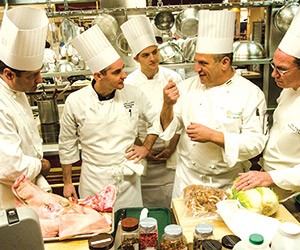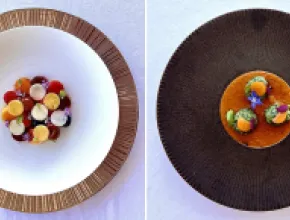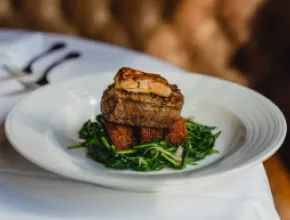“Ten to 20 years ago, banquet menus were printed and static,” says Stephen Rosenstock, senior vice president of food and beverage and brand standards at Omni Hotels & Resorts, “that’s very outdated now.”
Rosenstock refers to the changing landscape of event catering, as more and more properties and brands look to incorporate the organic, sustainable, local agriculture buzzwords into their culinary vernacular.
Omni Hotels, in an ongoing effort to stay at the industry’s forefront, created a four-day Culinary Masters Program that brings together select chefs from the 50 Omni properties throughout North America.
In November 2012, 15 Omni chefs and food and beverage executives arrived in California’s Napa Valley to study the latest in farm-to-table cuisine and take over the kitchens at the Culinary Institute of America at Greystone.
“What sets the Omni brand apart is what we’re doing to bring these chefs together and allow them to collaborate, so they can then sit down with meeting planners and provide great, creative ideas,” Rosenstock says.
The skilled chefs represented a range of properties, including Omni San Francisco, Omni Mont-Royal in Montreal, Omni Mount Washington in New Hampshire and Omni La Mansion del Rio in Dallas.
For planners looking to spice up their group dining menus, they offered valuable insight into the supply side of things.
The group sampled honey seconds after it was scraped from the hive, while Steven Barber, the executive chef at St. Helena’s charming Farmstead restaurant at Longmeadow Ranch, spoke about the importance of “the recipe for the recipe,” meaning that you can’t create good food without quality ingredients. Later, there was an enthusiastic hands-on demonstration of nose-to-tail cooking, and the chefs created myriad dishes from a locally raised hog.
Omni touts “performance dining,” which doesn’t refer to over-the-top theatrical programs, but instead signifies the importance of selecting healthy, nutrient-rich foods that positively impact physiological wellbeing—something especially important for attendees during long meetings and program sessions.
“This continuing education program is about stepping back from the day-to-day in the kitchen and seeing emerging trends restaurant kitchens and then applying them to groups,” Rosenstock says.
“In the last three to four years there has been a loss of distinction between banquet food and restaurant food,” Rosenstock says.
At Omni properties, this means that if planners eat in the hotel restaurant and enjoy it, they know the food served to their group will get the same careful preparation and presentation.






